 Stephen Geller Katz LCSW-R
Stephen Geller Katz LCSW-R
Misophonia Cognitive Retraining Therapy
 Stephen Geller Katz LCSW-R
Stephen Geller Katz LCSW-RMisophonia Cognitive Retraining Therapy
Misophonia Cognitive Retraining Therapy, as featured on the MTV True Life episode: “I Have Misophonia” premiering Friday, December 16th, 7:00 PM EST. See Clip >
|
|
|
| Moderate to severe anxiety triggered by chewing sounds, including: | ||
|
|
|
You may also be affected by visual stimuli, such as repetitive foot or body movements, fidgeting or movement you observe out of the corners of their eyes. Intense anxiety, rage and avoidant behavior may develop as a result of misophonia.
 * Do you feel your family and friends don’t understand how much you suffer?
* Do you feel your family and friends don’t understand how much you suffer?
* Do you often feel you can just suffer through a social event where there is eating present only to find that you must “escape” before you have a panic attack?
* Do you find that some people are at first understanding and make some efforts not to make the triggering sounds in front of you, but soon forget and constantly have to be reminded, causing you to feel angry, anxious and depressed?
* Are you avoiding social activities that you enjoy because of the misophonia?
* Are you fearful of losing your job and/or is the misophonia effecting your job performance?
You may be a candidate for Misophonia Cognitive Retraining Therapy, or MCRT.
Stephen Geller Katz, LCSW-R, with over 20 years of clinical experience, a New York University graduate, developed Misophonia Cognitive Retraining Therapy and founded Misophonia Cognitive Center™ in response to the growing number of people with Misophonia coming to his private practice from audiologists and ENTs. He discovered that by helping people to retrain and reinterpret the thoughts around their Misophonia, anxiety and depression symptoms began to improve. But even more important so did the Misophonic trigger response.
What are the treatment options for misophonia and other sound disorders? Misophonia is a condition that creates emotional turmoil because of certain sounds. These triggering sounds lead to physiological responses such as fight or flight and disrupt patients’ quality of life. The actual causes of this condition are still unknown, but experts suggest that many underlying conditions can lead to misophonia. For instance, people with OCD experience symptoms of misophonia as well.
People with misophonia describe this condition as irritating. Also, many patients said that when they hear a certain sound, their heartbeat increases, breathing slows, and they experience the outburst of anger. They feel so intimidated by the sound that they can’t control their anger and rage. In this condition, they can unconsciously attack the person making the sound.
Like other sound disorders, misophonia ranges from mild to severe conditions. Many people report that they develop emotional and physiological responses to various sounds. Here are some symptoms of misophonia and other sound disorders:
In severe conditions, a person with misophonia experiences:
If you are looking for a treatment for misophonia and sound disorders, many may say that you cannot cure misophonia and the disease will remain with you forever. There are ways to manage this condition, and in some cases people have been cured. Your doctor will help you identify the right technique to reduce the symptoms of misophonia. Here are some options to manage symptoms:
Cognitive-behavioral therapy is an effective therapy that navigates physical and emotional sensations that triggers irritating sounds. With the help of this therapy, you can identify your triggers and learn ways to ignore the triggering sound.
In this therapy, you have to wear a device in your ear that plays calming sounds. Tinnitus retraining therapy blends the irritating sounds with pleasant sounds so your brain accepts and tolerates the triggering sound. It is an effective way to reduce the ringing in the ear that you hear during tinnitus.
During counter-condition, the doctor will recommend an ear device that plays your favorite song. As a result, your brain won’t be able to concentrate on the triggering sound. There are various studies to prove that counter-conditions help reduces the symptoms of misophonia. A 2015 study suggests that a woman suffering from misophonia found this technique effective.
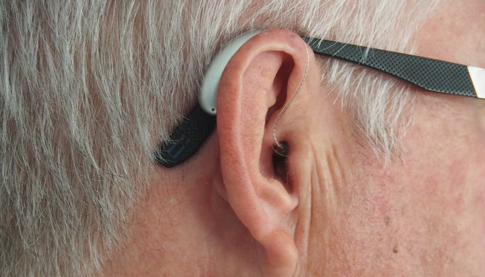
There are various scoping techniques you can practice to reduce the intensity of triggering sounds. Here are some options to try:
Experts recommend natural sounds such as the audio of rain to provide mental peace and relaxation. Also, it helps reduce the symptoms by deluding the mind.
Also, you can seek therapy with a trained health professional specializing in misophonia. As a result, you will find a space to communicate your challenges with an expert. When they understand the problems and triggers, you can learn strategies from them.
Are you looking for a treatment option to eliminate your misophonia symptoms? If yes, then contact the Misophonia Cognitive Center™, where you can consult with highly experienced expert Stephen Geller Katz. Dr. Katz will evaluate your triggers and responses and recommend an effective treatment method.
To schedule an appointment, call today:
Misophonia Cognitive Center™
Stephen Geller Katz
19 West 34th Street
Penthouse Floor
New York, NY 10001
646-585-2251
Tele-Video Sessions
Speak 5 languages
International Patients Welcome
Misophonia is a rare condition which is often mistaken for OCD or depression. Several doctors have failed to come up with proper solutions to get rid of this frustrating problem. However, the good news is that Dutch researchers seem to have found an answer to it! Which means it is possible to reduce the symptoms of Misophonia!
Cognitive Behavioral Therapy has clinically proven to be pretty successful for many. It is a special kind of psycho-therapy which mainly involves analyzing of one’s thoughts and feelings. Thoughts that influence and regulate your behavior. There is a whole thought process behind your actions. If you behave in an unpleasant manner or you say something harsh to someone for no apparent reason, there is a high possibility that you have spent a lot of time thinking negatively about things.
CBT is used to treat many other disorders like depression and addiction as well. Firstly, you will be asked by your therapist to be completely vocal about your thoughts, voice them out openly and then examine them. Then you will be asked to look at evidence from reality to see whether your thoughts are in support of reality or against it. By doing this exercise, you will be able to look at things rationally and objectively. This way your thought patterns can be identified and fixed.
It helps with Misophonia to a great extent.It will make you realize that your irritation and frustration is justified but it can be taken care of in a less violent way. Initially, you will struggle with your thoughts but eventually you will get there.
The ultimate goal of CBT is to teach patients that while you cannot control every little aspect of the world, you can take care of your own thoughts and emotions. You have complete control over how you interpret and deal with things in YOUR world. This behavioral therapy is highly goal oriented and if you are lucky enough to have a supportive therapist working with you, then they will make sure that you get through it until your goal has been reached.
Music Therapy is a newly discovered option to cope with Misophonia. It is not the same as listening to therapeutic songs. Your therapist will recommend you a certified clinician who is especially trained to select music for you. This therapy aims to enhance better responses to your problems. Furthermore, it will help you relax and reflect on your thought patterns, cope with stress and enhance your concentration levels. This special therapy often involves meditation exercises that will help you get calm and clear your mind.
Natural Remedies are also helpful in this regard. In addition to behavior and music therapy, you can add healthy foods to your diet. Your therapist may recommend you a sensory diet which is a blend of calming and energizing foods. These may help with misophonia regulation and auditory over sensitivity. Also, drink plenty of water and avoid GMO foods. Switch to a healthy and organic diet. Other than that, you must engage in physical activities such as swimming. Swimming will help you relax and has been known to assist regulate the sensory system. Spending time with nature is another excellent idea. Inhale exhale exercises and deep breathing after a good morning walk at the neighborhood park will surely make you feel fresher and lighter than usual.
For details about the intensity of your Misophonia, more tips and tricks and other related information, book your appointment with the best Misophonia specialist in NYC today!
Can you imagine going through your day with symptoms of extreme stress, rage, anxiety, and panic? This is a daily situation for people who suffer from misophonia, a form of a noise syndrome that alters how certain sounds effect you and your psyche. Symptoms range from moderate to severe but can be highly irritating for people just looking to make it through their day normally.
Because of advanced technology and medical improvements over time, doctors and psychologists have been able to develop treatments for misophonia. Regardless of how severe your symptoms are, you’ll be happy to know there is a treatment for you. To find out what kind or form of treatment you’d benefit from most, we can help you identify your symptoms and refer you to the best treatment for you! For information about the most common and effective treatments, take a look at the descriptions below!
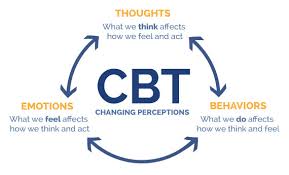 One of the most typical and recommended forms of treatment for misophonia noise and sound disorders is cognitive behavioral therapy. Cognitive behavioral therapy, otherwise known as the acronym CBT, is a way to retrain the brain and develop helpful coping skills in terms of sounds that trigger the symptoms in an individual. This form of therapy is helpful for moderate to severe symptoms.
One of the most typical and recommended forms of treatment for misophonia noise and sound disorders is cognitive behavioral therapy. Cognitive behavioral therapy, otherwise known as the acronym CBT, is a way to retrain the brain and develop helpful coping skills in terms of sounds that trigger the symptoms in an individual. This form of therapy is helpful for moderate to severe symptoms.
All people are different, so no one situation is the same. That’s where cognitive behavioral therapy comes to play. This form of therapy allows for a personalized approach regarding identification and reversal of triggers. The more sessions and visits with a registered and approved provider of CBT, the better and healthier you’ll be feeling. This is due to an increase of acknowledgement of your syndrome, symptoms, and how to control how they may affect you.
Frequently used in combination with cognitive behavioral therapy, tinnitus retraining therapy is a form of treatment that involves different treatments in one with hope to reverse symptoms and actions when triggered by a sound. Otherwise known as TRT, tinnitus retraining therapy allows people who suffer from misophonia to lead a normal life by incorporating pleasant sounds along with their triggers. This can be done through means of therapy, behind-ear speakers, and the development of positive associations through reinforcement measures. TRT treatment is often combined with cognitive behavioral therapy. These combined allow for greater success than when just trying to treat either the mind or the body alone.
 The use of medications and pharmaceutical treatment is another option offered by medical professionals when attempting to treat misophonia. This method is not preferred by many professionals but is used as a way to help those with severe symptoms. It is not preferential because the use of medicine does not directly benefit or encourage the improvement of the syndrome, but it hides and covers up symptoms by tricking the body and the brain’s signals and neurons from firing.
The use of medications and pharmaceutical treatment is another option offered by medical professionals when attempting to treat misophonia. This method is not preferred by many professionals but is used as a way to help those with severe symptoms. It is not preferential because the use of medicine does not directly benefit or encourage the improvement of the syndrome, but it hides and covers up symptoms by tricking the body and the brain’s signals and neurons from firing.
If your case is severe enough and is not greatly improving with other. Forms of therapy and treatment, medical aid may be recommended. Some typical medicines prescribed can include Klonopin and Lycra.
Some of the best ways to improve the way you feel throughout the day is you suffer from a noise disorder like misophonia is by receiving treatment from a professional. If you’re unsure of where to begin, Steven Katz LCSW can help you out. Contact the Misophonia Cognitive Center to schedule an appointment, identify your symptoms, and get you treatment! Stop living in fear of noise and get treatment today!
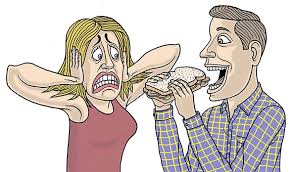 Once a person has identified that they are suffering from misophonia, seeking treatment usually doesn’t take too long to follow through. It’s one of the more annoying and unpleasant conditions a person can live with on a daily basis, and in some cases, individuals have described it as unbearable. There is no solid treatment route that’s guaranteed to get rid of the condition in every person, and in fact, resolving it for good is a tricky task. A large part of misophonia treatment procedures focus on addressing the symptoms and helping the patient live their lives normally despite the condition.
Once a person has identified that they are suffering from misophonia, seeking treatment usually doesn’t take too long to follow through. It’s one of the more annoying and unpleasant conditions a person can live with on a daily basis, and in some cases, individuals have described it as unbearable. There is no solid treatment route that’s guaranteed to get rid of the condition in every person, and in fact, resolving it for good is a tricky task. A large part of misophonia treatment procedures focus on addressing the symptoms and helping the patient live their lives normally despite the condition.
Misophonia is usually triggered by different events in people that suffer from it, and there is no standard list of irritating factors that could lead to an unpleasant sensation. In some cases, the patient may even be unaware of the majority of factors that contribute to the condition, making it important to pay attention to one’s daily health and wellbeing. It can often be helpful to keep a diary or some other type of log that tracks your daily life, pointing out the specific moments when your misophonia was triggered.
Once you know what types of sounds affect your condition and make things worse, the next step most people take is to block them out and give themselves some peace during the important hours of the day. Noise cancelling headphones can help a lot, although care must be taken to stay alert about your surroundings with the headphones on, in order to prevent an incident from occurring due to your inattentive status. In addition, high-end headphones can also predispose towards listening to music at dangerous volume levels, which can further contribute to harmful conditions in the future.
 It’s also important to reach out for proper help once you’ve identified the condition and have tried some simple remedies. Modern medicine can do a lot to help you manage the pain and get on with your daily life with a minimal level of interference – but it’s still up to you to take the first step and seek out professional help.
It’s also important to reach out for proper help once you’ve identified the condition and have tried some simple remedies. Modern medicine can do a lot to help you manage the pain and get on with your daily life with a minimal level of interference – but it’s still up to you to take the first step and seek out professional help.
If you’re in need of assistance with your misophonia and want to ensure that you’ll be treated by the best specialists in NYC, give us a call and we’ll set up an appointment to figure out the best possible course of treatment for your specific circumstances.
As more and more people are turning their attention to misophonia – including healthcare professionals, thankfully – you may be wondering if there might be something inside your head as well. The nature of the condition can make it difficult to self-diagnose in many cases, and it’s always preferred to get the opinion of a specialist if you’re not sure whether you might have it or not, but there are still some signs you can use to get a pretty good idea of what your current status is. There is a set of symptoms commonly associated with misophonia that tend to manifest themselves in most people who suffer from the condition.
Misophonia is typically linked to the presence of certain sounds in the environment, but only those. You may not get any negative response from sounds that drive others crazy, and vice versa. It’s important to make a list of specific sounds that seem to annoy you if you’re starting to suspect that you might have misophonia, in order to identify whether there’s a pattern or not. In some cases, you might simply find out that you’ve been getting triggered by a small set of sounds that everyone finds unpleasant, having nothing to do with misophonia.
Most people who suffer from misophonia describe their conditions as going above and beyond simple discomfort. Many people claim that the sensation is annoying enough to make them actually angry, and there have been reports of people lashing out after being provoked by their corresponding personal triggers. If your annoyance frequently develops into something much more significant and you find it hard to control those emotions, this might be a good sign that you’re indeed dealing with misophonia. That’s even more certain if you find yourself considering physical responses – or even acting on them.
Misophonia can make you associate some environments with unpleasant feelings, and it might even be difficult to figure out that these environments are the problem until you realize that they are saturated with the kinds of sounds that trigger your condition.
If you’re not sure whether it’s misophonia you’re dealing with or a simple minor annoyance, you should get in touch with us and set up an appointment with the leading misophonia specialists in NYC. Don’t put this off until it’s too late, it will be much more difficult to deal with the problem later on.
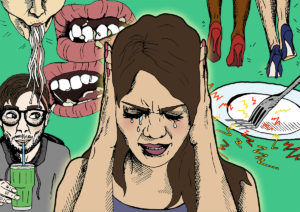 Hearing is perhaps the sense that people mistreat the most throughout their lives, especially in their earlier years. Going to loud concerts without earplugs, listening to music at high volumes through in-ear earphones, and various other things that we pay little thought to can come back in a very frightening way in the future. Misophonia is a troubling hearing condition that affects a person’s daily life, causing significant discomfort – and in some cases even distress – when certain specific sounds can be heard in the vicinity.
Hearing is perhaps the sense that people mistreat the most throughout their lives, especially in their earlier years. Going to loud concerts without earplugs, listening to music at high volumes through in-ear earphones, and various other things that we pay little thought to can come back in a very frightening way in the future. Misophonia is a troubling hearing condition that affects a person’s daily life, causing significant discomfort – and in some cases even distress – when certain specific sounds can be heard in the vicinity.
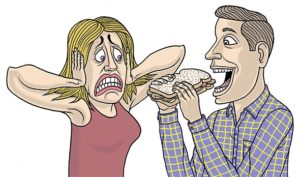 The main symptom of misophonia and the one people typically associate with the condition the most, is a general sense of extreme discomfort when a specific sound is heard. Different people respond to different sounds, and there doesn’t seem to be a common theme in what could trigger the condition. It’s also possible that the spectrum of harmful sounds can change over time, although reports on that seem to be somewhat conflicting at the moment.
The main symptom of misophonia and the one people typically associate with the condition the most, is a general sense of extreme discomfort when a specific sound is heard. Different people respond to different sounds, and there doesn’t seem to be a common theme in what could trigger the condition. It’s also possible that the spectrum of harmful sounds can change over time, although reports on that seem to be somewhat conflicting at the moment.
The exact mechanism behind the development of misophonia is still largely unknown, and the main hypothesis right now is that it has something to do with a malfunction in the nervous system. In that sense, misophonia appears to be a neurological disorder rather than a physical one related to the condition and healthiness of the ears. No concrete link has been established so far between a lifestyle that protects a person’s ears against hearing damage and the development of misophonia, although it certainly can’t hurt to ensure that the ears are treated with enough care and attention.
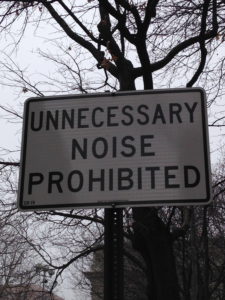 Medical science is still dealing with the problems caused by misophonia in somewhat experimental ways, although there are certain management courses established so far that seem to be showing good prospects. Treatment mostly boils down to learning how to cope with the situation and how to isolate the specific sounds that trigger it, although due to the way this therapy typically works, it’s not recommended to attempt it on one’s own. Professional assistance is strongly recommended to maximize the chances of seeing good results.
Medical science is still dealing with the problems caused by misophonia in somewhat experimental ways, although there are certain management courses established so far that seem to be showing good prospects. Treatment mostly boils down to learning how to cope with the situation and how to isolate the specific sounds that trigger it, although due to the way this therapy typically works, it’s not recommended to attempt it on one’s own. Professional assistance is strongly recommended to maximize the chances of seeing good results.
If you’re suffering from misophonia – or believe you may be – and are not sure what to do, don’t postpone treatment any further. Get in touch with us today and set up an appointment with the best misophonia specialists in NYC, and you’ll feel the difference in the quality of your daily life in no time!